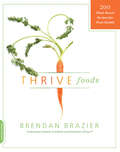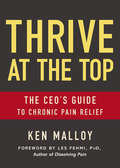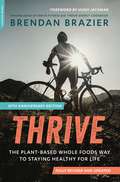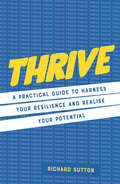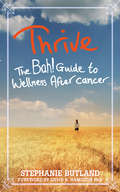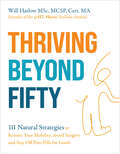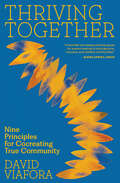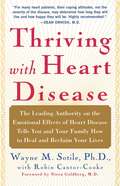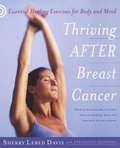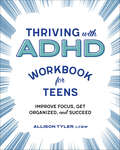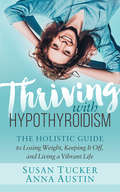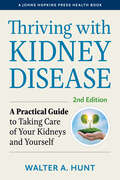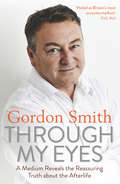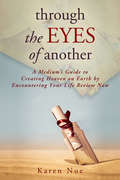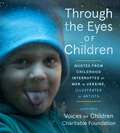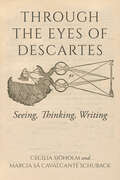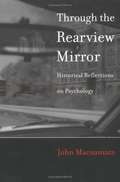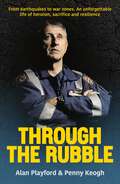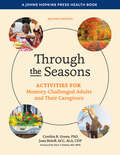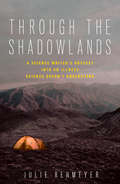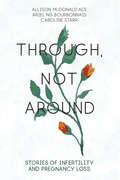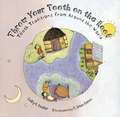- Table View
- List View
Thrive Foods: 200 Plant-Based Recipes for Peak Health
by Brendan BrazierFocusing on an environmentally friendly diet, Brendan Brazier's new book builds on the stress-reducing, health-boosting nutritional philosophy introduced in Thrive. Finding creative ways to use basic ingredients such as kale, blueberries, and wild rice, Thrive Foods recipes are plant-based and nutritionally complete. They utilize the power of superfoods such asmaca, chia, hemp, and chlorella and avoid ingredients like wheat, yeast, gluten, soy, dairy, and corn.If you're looking for sustainable energy, high-quality sleep, physical strength, and mental sharpness to meet modern-day demands, Thrive Foods is your go-to recipe source.
Thrive at the Top: The CEO's Guide to Chronic Pain Relief
by Ken MalloyFor those who are sacrificing well-being for success, Thrive at the Top offers game-changing insights and field-tested strategies leaders can apply quickly and easily to dissolve chronic pain and take of their health in the face of the complex demands of work and life.The rewards of a high-powered job can be substantial, but so can the demands, and learning to keep up with the challenges of staying healthy is the most important skill CEOs and other leaders must maintain for long-term success. When the inevitable physical and emotional symptoms of stress appear—back pain, headaches, anxiety, insomnia, etc.—as a result of putting the day-to-day of a job first, guilt and overwhelm are typically the first response. In Thrive at the Top, Mindbody Solutions executive coach Ken Malloy sheds lights on the causes of these stress symptoms and provides the tools and techniques readers need to live symptom-free. Corporate titans and entrepreneurs alike learn to engage with their work at full capacity while maintaining a state of relaxed productivity while quickly restoring their sense of stability in the face of difficult people and situations to create a balanced life and find relief from chronic pain.
Thrive, 10th Anniversary Edition: The Plant-Based Whole Foods Way to Staying Healthy for Life
by Brendan BrazierOne of the few professional athletes on an entirely plant-based diet, Brendan Brazier developed this easy-to-follow program to enhance his performance as an elite endurance athlete. Ten years later, his lifestyle still works. In this anniversary edition, Brendan brings 25 new recipes as well as updates throughout. Thrive features a 12-week whole foods meal plan, 125 easy-to-make recipes with raw food options that are free of dairy, gluten, soy, wheat, corn, refined sugar. With this program, you can lower body fat and increase muscle tone; diminish visible signs of aging; increase energy and mental clarity; sleep better and more restfully. Thrive is a long-term eating plan that will help you develop a lean body, sharp mind, and everlasting energy, whether you're a professional athlete or simply looking to boost your physical and mental health.
Thrive: A practical guide to harness your resilience and realize your potential
by Richard SuttonRichard Sutton has helped some of the world's top sports stars and business leaders achieve their full potential, and now he is making the tools they use to thrive available to everyone.We live in a world that demands perfection. Should we fail to live up to societal expectations, we experience a sense of failure, and fears and anxiety about a tenuous future. Added to this is the struggle with financial pressures and widening gaps in inequality, chronic stress and mental health challenges.Yet, in truth, it doesn&’t matter where we come from and what our historic circumstances and achievements might be. We are all capable of extraordinary lives and should not be bound by limitations, whether self-imposed or from external sources.Resilience can help you to unlock your fullest potential; it is a consummate skill that can be developed and grown throughout your life. This book reveals all the practical tools you need:Discover the 8 secrets of neuroscience that will unlock your increased resilienceTake a masterclass in behavioural science designed for Olympic athletes, by learning the 7 key skills that give you the mindset of a championTake the tests provided to understand your personal resilience scores and reveal where you can develop and growBe inspired by the stories of real people, including Michael Phelps, Michael Jordan, Usain Bolt, Martina Navratilova and Sifan Hassan, who have used these same techniques to achieve successThrive is a rich source of unique and practical skills and tools that are easy to apply in everyday life to help you develop and harness your resilience, and to realise your fullest potential.
Thrive: The Bah! Guide to Wellness After Cancer
by Stephanie ButlandThere's still a part of us that thinks surviving cancer is a bit of freakish good fortune – the medical equivalent of having a cannonball go right through your middle and living to tell the tale – and so often it's hard to know how to 'do' life after cancer. Thrive: The Bah! Guide to Wellness after cancer focuses on moving on from a major physical, social and psychological trauma. Like Stephanie's first book, How I Said Bah! to cancer: A Guide to Thinking, Laughing, Living, and Dancing Your Way Through, Thrive uses a blend of storytelling, practical advice, humour, thinking techniques and strategies, visualisations, meditations, questions, candour and common sense designed to help those who have had a cancer to get from survival to a place where they are truly thriving.
Thriving Beyond Fifty (Expanded Edition): 111 Natural Strategies to Restore Your Mobility, Avoid Surgery and Stay Off Pain Pills for Good
by Will Harlow BSc, MSx, MCSPm Cert. MATHE SUNDAY TIMES BESTSELLERRebuild strength, flexibility and confidence through proven exercises to target the causes of aches, pains and strains that come with age.What if growing older didn&’t have to mean growing weaker? If you&’ve been told that pain in your back, shoulders or knees is just part of ageing, it&’s time to rethink what&’s possible. Thriving Beyond Fifty is a warm, expert-led guide to restoring mobility, improving flexibility and building natural strength – using simple exercises you can do at home.Written by physiotherapist Will Harlow, this book offers 111 safe, targeted stretching and movement routines designed specifically for those over 50 to treat a range of common conditions. Whether you&’re managing arthritis, recovering from injury or just feeling stiff from years of sitting, these gentle methods help you feel stronger, more comfortable and more confident in your everyday life.You&’ll discover how to:· Address common causes of back, shoulder, neck, hip and knee pain· Improve your posture, balance and mobility with step-by-step home exercises· Protect your joints from arthritis and inflammation with smarter movement tips· Boost your energy and resilience using natural stretching and strengthening routines· Build a daily practice that supports long-term flexibility, independence and vitalityThriving Beyond Fifty is more than a fitness book – it&’s a compassionate guide to reclaiming your body and re-engaging with the life you love. Whether your goal is to improve your walking, garden without strain or simply get up from the floor with ease, this guide meets you where you are and helps you move forward – one stretch at a time.
Thriving Together: Nine Principles for Cocreating True Community
by David ViaforaSeasoned community builder David Viafora pinpoints the nine principles that create conditions for joy and solidity in any communityResearch over the last few decades reveals that our social fabric is unraveling as rates of isolation and loneliness continue to rise, climate crises intensify, and an individualistic worldview prevails. Is there another way to live? Where can we turn for guidance and hope in the face of such challenges? In this astute and empowering guide, David Viafora, a former Buddhist monk, points to community building as a fresh yet ancient and powerful way to face our most pressing individual, social, and ecological challenges. With precision, enthusiasm, and deep humility, Viafora draws from his own vast experience of mindfulness communities to offer inspiration and concrete guidance in growing thriving communities from the inside out. The nine principles Viafora uncovers for successful community—including Visioning, Service, Joy, and Reconciliation—are broad and easily applicable to our existing groups and relationships. Yet their potential to reshape the most basic elements of our life and friendships is revolutionary. With these nine principles in hand, we can cocreate another way of being—beyond isolation, individualism, and despair. In true community, we don&’t have to face the difficulties of the world on our own. What we can embrace and heal as a community is far greater and more fulfilling than what we could ever achieve alone. Whether your aim is to start a new group, strengthen the community you already belong to, or explore what mindful community living has to offer, Thriving Together teaches us how to:• Collectively create a vision to guide your community&’s unique growth and purpose• Strengthen the culture of joy, appreciation, and peace in your family or community• Nurture vibrant, compassionate friendships as the foundation of community life• Strengthen the muscles of reconciliation through simple yet powerful communication practices• Embark upon meaningful service projects that nourish and heal both your community and others• Protect your community by creating healthy boundaries in relationship to power dynamics• Embrace racial healing as a path of compassionate and inclusive community building
Thriving With Heart Disease
by Robin Cantor-Cooke Wayne SotileNot only can you survive with heart disease, you can actually thrive with it -- for many, many years to come. If you are one of the 61 million Americans diagnosed with heart disease -- whether you've had a heart attack or surgery, or you have high blood pressure or angina -- you can learn how to handle its psychological side effects with the lifesaving strategies in this book. Acclaimed cardiac psychologist Wayne M. Sotile, Ph.D., reveals what every heart patient needs to know: how you feel about the illness and how you cope with it can determine how fully you recover. Dr. Sotile teaches you how to achieve emotional well-being over the four basic stages of recovery, during which you and your family learn to accept the disease, grasp what's involved in treatment and recovery, and learn to work together as a team. You will also learn to create and adapt to a "new normal" way of life and make a commitment to living with the illness, not in spite of it. Written with reassuring warmth, sensitivity, and humor, Thriving with Heart Disease is your guide to creating the robust, healthy life you were meant to lead, surrounded by the people you love.
Thriving after Breast Cancer
by Sherry Lebed Davis Stephanie GunningA breakthrough book for America's 2. 5 million breast cancer survivors, showcasing the pioneering "Focus on Healing" exercise-and-movement program touted by physicians coast-to-coast and recommended by the American Cancer Society. The months following breast cancer treatment can bring a difficult combination of emotional and physical challenges, including a decreased range of motion, pain, fatigue, and depression. But when Sherry Lebed Davis's mother was diagnosed with breast cancer in 1979, Davis and her two brothers, both physicians, created a special movement therapy program to speed their mother's healing. Spurring extraordinary success in her and many others, "Focus on Healing" soon became on of the first hospital-endorsed dance and exercise programs in the nation, a prescription that Davis came to appreciate even more when she herself became a breast-cancer survivor in 1996. Taking a unique, proven approach to healing,Thriving After Breast Cancershares the easy-to-follow techniques that have improved the lives of thousands of patients. Embracing psychological recovery and treatment of chronic pain, Davis's "Focus on Healing" regimen consists of stretches and dance-inspired moves that restore flexibility and balance while minimizing discomfort. With exercises to address a full range of specific situations, whether the reader has experienced chemotherapy, a lumpectomy, of a full masectomy,Thriving After Breast Canceroffers solutions that can be gently eased into a patient's routine. Now adopted by more than one hundred hospitals around the country (including New York City's prestigious Memorial Sloan-Kettering) and picking up where medical treatment leaves off, Davis's program gives breast cancer survivors an uplifting, empowering next step on the road to restoring the life that they life. From the Trade Paperback edition.
Thriving with ADHD Workbook for Teens: Improve Focus, Get Organized, and Succeed
by Allison TylerBuild focus, organization skills, and self-confidence with this supportive ADHD workbook for teens ages 12 to 17Does it feel hard to stay organized sometimes? Do homework assignments sneak up on you? Having ADHD can feel overwhelming, but the Thriving with ADHD Workbook for Teens gives you the tools to understand how ADHD works, and actionable ways that you can use it to your advantage. Learn about some of your untapped strengths and see how you can channel your newly identified talents at school, in sports, and with friends.Inside this ADHD workbook for kids 12 to 17 you'll find:Ways to get to know your brain—This ADHD book for kids and teens helps you understand how your executive functioning skills work to help you organize, plan, react, and more.Frequently asked, always answered—Go beyond other books for kids with ADHD with a Q&A section that provides answers to common questions that young people with ADHD often ask.Advice you can use—Discover everyday tools that give you simple but effective strategies for approaching routine things like homework, hobbies, chores, relationships, and more.Learn how you can thrive with ADHD through the engaging activities in this ADHD book for teens.
Thriving with Hypothyroidism: The Holistic Guide to Losing Weight, Keeping It Off, and Living a Vibrant Life
by Susan Tucker Anna AustinThriving with Hypothyroidism is an empowering guide for women to lose weight, keep it off, and live a vibrant life despite having hypothyroidism. Women with hypothyroidism often feel like the disease is hijacking their life, sabotaging their efforts to lose weight, keep it off and preventing them from living an energy-filled life. Many women with hypothyroidism have been told that “Your thyroid test came back in the normal range!” or “The dose of thyroid hormone you are on is perfect!” yet they still feel hypothyroid symptoms. Or maybe they’ve been told, “Your weight gain is not due to your thyroid. Maybe you’re eating too much and not getting enough exercise!” It sounds all too familiar, and it’s a vicious cycle! After Anna Austin was diagnosed with hypothyroidism at such a young age, Susan Tucker did everything she could for her daughter to get to the root cause of the symptoms Anna was experiencing, even after starting medication. Thriving with Hypothyroidism is about empowering women to take an active role in their health in stopping the progression of thyroid disease and not settling living with symptoms for the rest of their lives. Susan and Anna help people understand that there’s more to preventing hypothyroidism than just taking medication. Rather, women can improve symptoms and thyroid function through a more natural, whole-body approach. Thriving with Hypothyroidism comes from 20 years of research, personal experience, and education in getting to the root causes of Susan and Anna’s own hypothyroidism. Susan and Anna share how to stop the progression of thyroid disease, lose weight and keep it off, and have a more energetic life!
Thriving with Kidney Disease: A Practical Guide to Taking Care of Your Kidneys and Yourself (A Johns Hopkins Press Health Book)
by Walter A. HuntA complete guide to caring for your kidneys and maximizing your health.Kidney disease occurs when your kidneys are damaged and no longer function as well as they should. In the past, it was fatal, but thanks to new treatments, including dialysis and transplantation, people can live long and healthy lives. This book provides everything you need to know to help you cope with your kidney disease and maximize your health. Walter A. Hunt, a medical researcher who had kidney disease and received a kidney transplant, walks you through what science says about how you can take care of your kidneys, including what foods to avoid and what treatment options may be best for you. Also included are recommendations to help you sleep and feel better along with overall health advice. In this latest edition, Hunt adds new sections on emerging subjects, including• coping skills for caregivers• kidney disease in children• environmental causes of chronic kidney failure• conservative care for those who wish to decline treatment• related conditions like gout, depression, and sleep disturbances• diet after transplantation• how best to work with your care team• insurance issues• potential new treatmentsA useful guide for the healthcare professionals who work with individuals with kidney problems.
Through My Eyes: A Medium Reveals The Reassuring Truth About The Afterlife
by Gordon SmithGordon Smith has been hailed as "Britain’s most accurate medium" and his life has fascinated not only his fans, but has intrigued scientists alike. In this autobiographical book, Gordon opens a window onto his life to give readers an idea of what the world looks and feels like for a medium. He walks the reader through the diverse situations he has found himself in and gives detailed insight into the many readings he has given. He explains what it actually feels like when Spirits communicate through him and answers many of the questions about death that haunt the bereaved. Yet the most fascinating thing that Gordon reveals is about his role as a medium: overthrowing the stereotypes, Gordon shows that a medium’s job is not just to converse with Spirits, but to heal the living. When people are grieving the loss of a loved one, Gordon’s messages can ease grief, answer unresolved questions, bring comfort, give hope, and reassure the living of the peaceful afterlife that their loved ones have passed on to. Gordon shares many stories of people who have found peace and resolution from his messages. These are people who have been so affected by Gordon’s work that they are happy for him to tell their story in this book with the desire of helping others who are experiencing pain and sorrow. Gordon hopes that this intimate and candid book will offer great wisdom, comfort, and practical advice to his thousands of readers.This is a repackage of Through My Eyes (ISBN: 9781401915254)
Through My Eyes: The Story of a Surgeon Who Took On the Medical World
by Charles D. Kelman"This book may ruffle feathers and bruise egos, but its fascinating tale adds a human quality to medical research." Dr. Frank Field Through My Eyes reads like a true adventure story. From the day his high school principal told him he wasn't college material and ought to go to trade school, Charles Kelman has upset conventional wisdom - with stunning success. As a pioneering ophthalmologist, Dr. Kelman bucked the whole medical establishment in his search for a less risky, less intrusive, and more effective method of cataract removal. Today, thanks to his persistence and smarts, thousands of people can see again. The "Rocky" of medicine, Dr. Kelman recounts his early struggles to achieve a breakthrough in surgical procedure-a battle Dr. Kelman had to wage in the face of intense skepticism from his colleagues. Through My Eyes tells the stories of the many famous people whose sight Dr. Kelman ultimately managed to save, including actress Hedy Lamarr, Senator Bob Packwood, jazz musician Lionel Hampton, singer Jan Peerce, and hundreds of others. But Charles Kelman also has a burgeoning second career- as a singer, saxophonist, and comedian. To his friends and fans he's known as "Dr. Jazz." And when he's not performing cataract surgery, he's performing at Carnegie Hall in New York, Caesar's Palace in Las Vegas, the Atlantis in Atlantic City, or on the "Tonight Show" with Johnny Carson. He has appeared on the stage with such performers as Glen Campbell, the Spinners, and Lionel Hampton. Through My Eyes shows how single-minded persistence and determination pay off. While this autobiography is bound to stir controversy in the medical world, Dr. Charles Kelman's story combines scientific savvy with personal style-showing how one adventurous man, all by himself, can make good, and make a difference. Charles D. Kelman, M.D., is a practicing ophthalmologist in New York City and the author of Cataracts: What You Must Know About Them. He is a clinical professor of Ophthalmology at New York Medical College. In addition to his regular medical duties, he is currently conducting research into macular degeneration of the retina, and-in his show business career-he is writing a musical for Broadway. Dr. Kelman lives in New York City.
Through the Eyes of Aliens: A Book About Autistic People
by Jasmine Lee O'NeillThe author, who describes herself as a person with autism, describes this condition as rare and beautiful. She offers suggestions to parents, teachers, and caregivers, encouraging them to respect the autistic person's uniqueness and wholeness. She urges that autistic people should be accepted for who they are, and that efforts to change them and rid them of autism are futile and painful for everyone concerned.
Through the Eyes of Another: A Medium's Guide To Creating Heaven On Earth By Encountering Your Life Review Now
by Karen NoeAs a psychic medium, Karen Noe often receives messages of regret—deceased loved ones communicate that they’re now able to see that they should have said or done things differently when they were still on Earth. In Through the Eyes of Another, Karen shows that you don’t have to die to go through your life review. You can go through it now . . . before it’s too late. Karen explains how writing different types of letters can help you see the "bigger picture" of the way you’re affecting those in your path. She takes you on a personal journey of how her life was transformed after she wrote these types of letters to her loved ones, and then goes on to demonstrate how you can do the same. By seeing everything through the eyes of others, you will learn how to: • Heal your relationships • Love and honor yourself • Forgive your living and deceased loved ones • See more positive aspects in those around you • Understand more fully why others do certain things • Become more compassionateAs an added bonus, Karen shares stories from her favorite readings to answer some of the most common questions people have concerning the afterlife.
Through the Eyes of Children: Quotes from Childhood Interrupted by War in Ukraine, Illustrated by Artists
by Voices of Charitable FoundationA heartrending and beautiful trilingual book that gives voice to the children of war-torn Ukraine, interspersed with moving works of art.What is it like to be a child living in a country under siege—or living in a foreign city or land far from everything you have known and loved? In this moving and unforgettable book, Ukraine’s children speak out about growing up in amid the violence, terror, and death of war. Through the Eyes of Children is a collection of children’s quotes paired with evocative color artwork. Each quote appears in Cyrillic, transliterated Ukrainian, and English, making the book a tool for both language learning and language preservation.Each copy sold funds a week’s mental health assistance for a Ukrainian child.
Through the Eyes of Descartes: Seeing, Thinking, Writing (Studies in Continental Thought)
by Cecilia Sjöholm Marcia Sá Schuback"I shall here present my life," writes Descartes in Discourse on Method, "as in a painting" and my method "as a fable." Through the Eyes of Descartes demonstrates how a Cartesian aesthetics is interwoven in his thought. It brings together a variety of materials: his metaphysical writings and essays in natural philosophy, through to his letters, drawings, and printed images.Cecilia Sjöholm and Marcia Sá Cavalcante Schuback seek to bring Descartes into dialogue with contemporary phenomenology as well as contemporary psychoanalytic thought. They focus on how perception interacts with emotions and thought, and the way in which our gaze is directed toward limit-phenomena of beauty and fascination.In Through the Eyes of Descartes, Cecilia Sjöholm and Marcia Sá Cavalcante Schuback counter the traditional picture of Descartes by presenting his work in an entirely different light: a Descartes of the arts, of sensibility, of inner images, and of imagination.
Through the Rearview Mirror: Historical Reflections on Psychology
by John MacnamaraJohn Macnamara shows how a number of important thinkers through the ages have approached problems of mental representation and the acquisition of knowledge.
Through the Rubble: From Earthquakes to War Zones. A Story of Survival and Service
by Alan Playford Penny KeoghAn unforgettable life of heroism, sacrifice, and resilience.In Through the Rubble, Alan Playford recounts his extraordinary life, marked by the dramatic moment he emerged from the wreckage of the Newcastle Workers Club during the 1989 earthquake. Alan became a national hero after rescuing Norm Duffy from beneath the rubble. In news coverage that circled the globe, Alan embodied the courage and determination of paramedics whose lives inspire admiration. For the paramedic known as 'Scoop,' this was simply another day on the job. To those who know him best, it was his destiny. Alan has been at the heart of defining moments in Australian history and global conflict, moments that forever changed the practice of paramedicine and saved millions of lives. This gripping memoir traces Alan&’s remarkable career, from his early struggles to modernise the ambulance service and launch helicopter rescue in Australia, to his life-saving work in global conflict zones. Alan served on the frontlines in Rwanda, East Timor, and the Solomon Islands, providing aid in dangerous environments and rescuing countless lives from the brink of death. A pioneer in the field, in 1989 Alan founded the Westpac helicopter service, which has since been integral in saving lives nationally. His bravery continued during domestic crises like the 2003 Canberra bushfires, where his calm under pressure earned him Australia&’s highest honours. Alan shares dramatic moments of heroism and the emotional toll of a career spent on the frontlines. He reveals the psychological burdens borne by those who serve, offering a deep look into the personal sacrifices made to protect others. This memoir is both a thrilling account of one man&’s life of service and a testament to the resilience of the human spirit in the face of unimaginable odds. Alan Playford&’s Through the Rubble offers an unforgettable portrait of a true hero—someone whose courage, compassion, and determination have shaped paramedicine and saved countless lives, both in Australia and around the world.
Through the Seasons: Activities for Memory-Challenged Adults and Their Caregivers (A Johns Hopkins Press Health Book)
by Cynthia R. Green Joan BeloffA collection of easy-to-follow activities, organized by seasons of the year, to help family members and caregivers engage with memory-challenged adults.Dementia and related disorders impact the lives of those affected in countless ways, making it difficult to remain independent at work, at home, and in the wider world. But recent studies have shown that structured activities can make a significant, positive difference by stimulating mental engagement while improving interactions between caregivers and memory-challenged adults.Fun and easy to use, this large-format, full-color picture book is divided into themes representing the four seasons. Each section describes several multisensory experiences—such as walking on the beach, making ice cream, or planting flowers—along with related topics for discussion and activities to elicit memories and encourage new positive associations. The topics and activities incorporate all five senses to facilitate connections and conversations.The book adopts a compassionate, person-centered approach and is designed so that two people can easily look together while sitting side by side. This latest edition, which has been thoroughly revised, • takes a multicultural approach• includes all-new images, as well as 14 completely new highlighted activities • integrates modern wellness concepts• features a new introduction and an updated resource section• offers guidance about activity planning and optimizing interactions between care partners and the individual with dementiaHelping you and your loved one make cherished new memories, Through the Seasons is an indispensable solution to the question of what to do together to maintain well-being and connection.
Through the Shadowlands: A Science Writer's Odyssey into an Illness Science Doesn't Understand
by Julie RehmeyerJulie Rehmeyer felt like she was going to the desert to die.Julie fully expected to be breathing at the end of the trip—but driving into Death Valley felt like giving up, surrendering. She’d spent years battling a mysterious illness so extreme that she often couldn’t turn over in her bed. The top specialists in the world were powerless to help, and research on her disease, chronic fatigue syndrome, was at a near standstill. Having exhausted the plausible ideas, Julie turned to an implausible one. Going against both her instincts and her training as a science journalist and mathematician, she followed the advice of strangers she’d met on the Internet. Their theory—that mold in her home and possessions was making her sick—struck her as wacky pseudoscience. But they had recovered from chronic fatigue syndrome as severe as hers.To test the theory that toxic mold was making her sick, Julie drove into the desert alone, leaving behind everything she owned. She wasn’t even certain she was well enough to take care of herself once she was there. She felt stripped not only of the life she’d known, but any future she could imagine.With only her scientific savvy, investigative journalism skills, and dog, Frances, to rely on, Julie carved out her own path to wellness—and uncovered how shocking scientific neglect and misconduct had forced her and millions of others to go it alone. In stunning prose, she describes how her illness transformed her understanding of science, medicine, and spirituality. Through the Shadowlands brings scientific authority to a misunderstood disease and spins an incredible and compelling story of tenacity, resourcefulness, acceptance, and love.
Through, Not Around: Stories of Infertility and Pregnancy Loss
by Allison McDonald Ace Caroline Starr Ariel Ng BourbonnaisEverything doesn't (always) happen for a reason. Infertility and pregnancy loss can be devastating, yet both are often private sorrows for the one in six people who cope with the experience. This collection offers personal stories about what it's like to go through the emotional and physical facets of infertility, miscarriage, and pregnancy loss: the pain, sadness, and desperation, the hope, humour, and frustration. Through, Not Around offers reassurance to those in the midst of their own struggles that they are not alone and that it is possible to find acceptance and strength on the other side of grief. The way forward is by going through the grief, not around it. Allison McDonald Ace, Ariel Ng Bourbonnais, and Caroline Starr are co-founders of The 16 Percent, a website dedicated to sharing stories of pregnancy loss and infertility. To read or share your story, visit the16percent.ca.
Throw Your Tooth On The Roof: Tooth Traditions From Around The World
by Selby B. Beeler<P>What do you do when you lose a tooth? Do you put it under your pillow and wait for the tooth fairy? Not if you live in Botswana! In Botswana, children throw their teeth onto the roof. In Afghanistan they drop their teeth down mouse holes, and in Egypt they fling their teeth at the sun! Travel around the world and discover the surprising things children do when they lose a tooth. <P>Selby B. Beeler spent years collecting traditions from every corner of the globe for this whimsical book, and illustrator G. Brian Karas adds to the fun, filling every page with humorous detail. He perfectly captures the excitement and pride that children experience when a tooth falls out. <P>This title has been selected as a Common Core Text Exemplar (Grades 2-3, Informational Texts)
